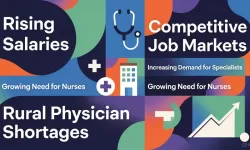Providers say the most attractive qualities of working in a rural healthcare facility are lower cost of living, more time with patients and better work-life balance
by Intelliworx
When it comes to recruiting providers, healthcare facilities don’t get a second chance to make a good first impression. That’s one high-level finding of a 5-question snap survey of 107 U.S. healthcare providers we just fielded.
This matters because healthcare is already facing a talent shortage. The matter is even more acute in rural facilities because the available talent pool is smaller and shrinking as the Baby Boomer Generation retires. Rural facilities will have to work harder to attract talent.
There is room for optimism too though. Providers also shared what they see as the benefits of working for a rural facility. The fact is many providers are attracted to the medical community out of a sense of compassion for humanity. It’s natural then to have providers who insist that the employers they choose to work for share that perspective.
The complete findings from this survey follow below.
1. A glimpse into providers’ experience with healthcare hiring processes
Most healthcare providers (79%) surveyed say the hiring process that led to their last position – from the initial recruiting contact to onboarding and credentialing – was smooth and easy. However, another 16% expressed dissatisfaction while an additional 6% were indifferent.
We also asked respondents “Why?”
Among those who said they had a positive hiring experience wrote the following in open-ended comments:
- “It was as simple as me sending in my resume and the company calling me in for an interview.”
- “I was already within the system.”
- “Their orientation process was very structured and informative.”
Those who were dissatisfied with the hiring process were more vocal. The following is a representative sample of their open-ended comments:
- “The slow return on background checks and waiting on start date from HR.”
- “Onboarding with my new employer was not organized.”
- “The process at my organization is long and drawn out. It also made me go through classes that did not pertain to my job. Then did not give me the resources to DO my job.”
- “Too much redundancy during the credentialing process. Should be streamlined.”
- “It took weeks to get a call back about my application. Then weeks to set up an interview. Then weeks to be hired on and start my first day.”
Takeaway: Most healthcare organizations have refined their hiring processes, yet a significant number have work left to do. Even seemingly small things – like asking candidates with a medical degree to spend time copying and pasting their resume from a well-constructed resume into an old system – can be a turn-off. A candidate might conclude from that experience that if they land the job, all the technology in their new role will be similarly old and rickety.
Streamlining the process can help a hospital become a more attractive employer, but it also has a much larger financial impact. This is because vacant positions cannot see or treat patients.
(click image for higher resolution)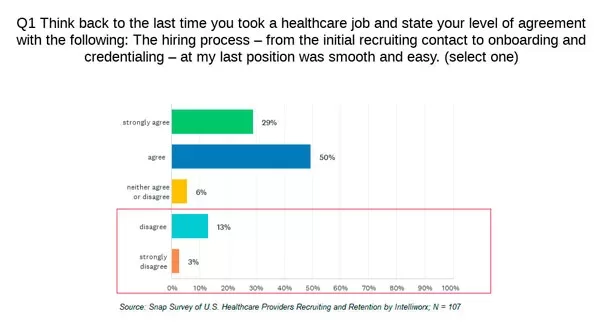
2. Providers will stop pursuing a position if the recruiting experience is flawed
A significant number of providers surveyed said they would stop pursuing a new healthcare position if they found themselves having a poor experience during the recruiting process. Nearly half (45%) indicate they’d take themselves out of the running for a role for this reason.
This number was higher than the percentage of providers who said they’d continue on despite a poor experience (40%). That number includes 27% who indicated they “probably” would not end their effort to land the role and another 13% who said they definitely would not.
Here again, we asked respondents the optional and open-ended follow-up question: “Why?”
Those who said they’d continue pursuing a role despite a poor recruiting experience wrote:
- “Healthcare is my passion and I can’t see myself doing anything else.”
- “I love my job I don’t want to do anything else.”
- “Love healthcare.”
Those who would end their candidacy for a given role because of a bad experience wrote:
- “Because lack of organization from the beginning tells me a lot about the organization as a whole and what I could possibly getting into.”
- “Their ability to do their job in a timely manner is a glimpse of the overall company’s policies then I would not be interested in the job.”
- “Because if recruiting is done poorly no way patient care runs smoothly and culture is healthy.”
- “If the recruitment process is poor what is the company like as a whole.”
- “I have experienced poor orientation experiences and left the position.”
Takeaway: A chaotic recruiting and onboarding process can and does frighten away provider candidates. As the old saying goes, if the courtship is rocky, so too will the marriage. Given there is already a shortage of healthcare talent, losing candidates over poor recruiting or onboarding experience is a costly, if not unforced and correctable error.
(click image for higher resolution)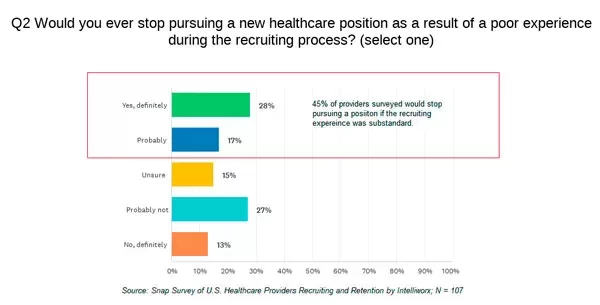
3. Rural healthcare has to work harder to attract providers
Most of the providers surveyed (57%) said they are working in a rural facility (10%), have worked in a rural facility (7%) or would consider working in a rural facility (40%).
However, another 43% have ruled out ever working in a rural area. This means the size of the total talent pool available to rural facilities is smaller than that of their competitors in urban areas.
Several providers shared their reasoning in an optional open-ended comment field.
Those who are opposed to working work in a rural area wrote:
- “I’m in med school right now which is in the city.”
- “Rural Healthcare lacks the resources to properly care for patients.”
- “I just prefer where I’m at.”
Those who are open to working in a rural healthcare facility wrote:
- “Because it is hard for people in rural areas to receive optimal health care.”
- “This is where I work at the moment and do not see myself doing anything else.”
- “Planning on moving to Alabama in 3 years and would definitely look for a position in a rural area.”
- “Possibly when I retire.”
Takeaway: Rural areas struggle to attract provider talent for a range of reasons. One that shows up in other research and is reflected here is that most medical schools are in urban areas, and students tend to stay where they were trained.
Another common reason is the lack of resources, though that can mean different things to different people. For example, two respondents in this survey had opposite answers but for the same reason. Where one cites a lack of resources as a reason for avoiding working in a rural area – another one sees this as the primary motivation for pursuing such a role.
By measure of this survey, rural healthcare begins the recruiting process with a smaller pool of candidates. If there are 10 candidates with qualifications, four will rule out a rural position from the get-go. So, rural healthcare has to work harder to attract providers.
(click image for higher resolution)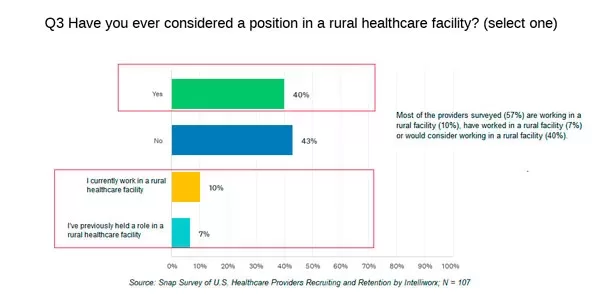
4. The top benefits of working in rural healthcare, according to providers
We asked providers what they thought were the top benefits of working in a rural area. The top three benefits tallied up this way:
- 47% said the lower cost of living;
- 46% said more time with patients; and
- 45% said better work-life balance.
There are of course other benefits and here’s how the remainder stacked up:
- 31% said slower pace of rural life;
- 23% said job security;
- 17% said greater sense of purpose;
- 15% said cross-training and professional development;
- 11% said good organizational culture;
- 10% said more autonomy to manage work; and
- 10% said leadership opportunities.
Just one provider chose “other” and wrote in a comment: “None of these are true. They still only care about how much money you bring in, not the care you provide.”
Takeaway: This is perhaps the most valuable question on this survey for rural healthcare recruiters and HR staff. Leaders would do well to emphasize the benefits that appeal to potential provider candidates.
(click image for higher resolution)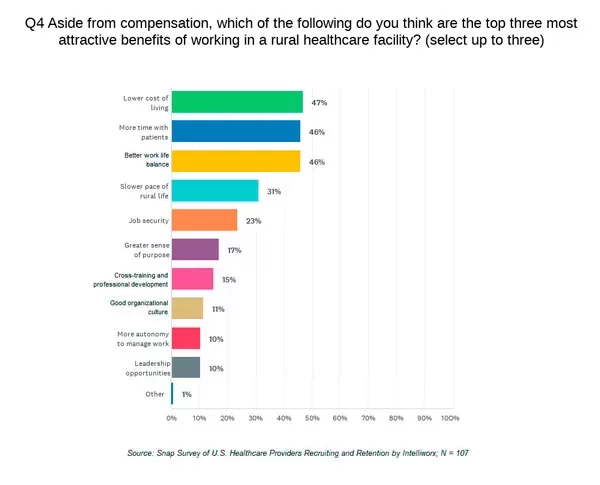
5. Keep an eye on retention
Most providers surveyed agree (47%) or strongly agree (10%) that their employer puts the proper focus on retaining the staff they’ve employed. Another 20% indicated they were unsure – and nearly one in four (23%) disagreed or strongly disagreed.
Open-ended comments on this question were nearly all from those who disagreed – and the views expressed were quite raw:
- “My organization is more concerned with CEO bonuses than retaining its employees.”
- “They don’t care about me or patients, just about bottom line.”
- “Treated like number.”
- “Just a warm body… they want younger doctors.”
- “Retention involves keeping your personnel. You actually have to make an effort other than candy and pizza parties.”
Takeaway: It’s not enough to focus on attracting talent to rural areas – administrators should ensure they are focused on retention as well. The sentiment expressed on this survey suggests this costs something that can’t be purchased. Many providers are attracted to the medical community out of a sense of compassion for humanity – and they want to know their employers share that perspective.
(click image for higher resolution)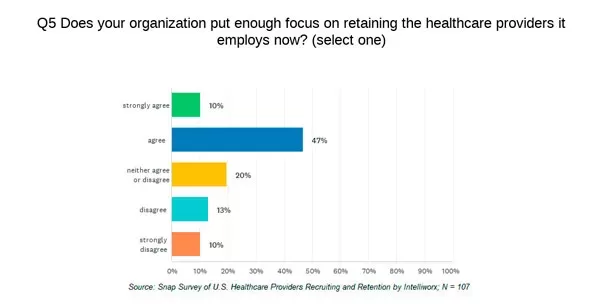
* * *
About the survey
Intelliworx polled 107 U.S. healthcare providers in March of 2024. Respondents were solicited through an independent and commercial survey panel.
If you enjoyed this post, you might also like:
A Porter’s Five Forces Analysis for Provider Talent in Rural Healthcare

